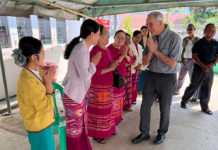The road not taken
Editor: We are the managing members of Kelly Road, LLC, which owns Kelly Road. Kelly Road is a private road providing the sole access to what is now Preservation Ranch. Various media outlets have mentioned the possibility of public access to this land should it be purchased by the open space district. We have informed the key players in the transaction but the public should also know: the easement over Kelly Road serving the property at issue explicitly precludes public access. The operative language can be found at the Recorder’s Office in Book 3319, page 522, paragraph 9. We intend to stand on our rights and oppose any action taken to provide public access over Kelly Road.
Dave and Bunny Lewers
Managing Members
Kelly Road, LLC
Community choice
Editor: Are you happy that PG&E is the only place you can buy your electricity? Is it okay with you that only 19 percent of the power you buy from PG&E comes from renewable sources? If you have solar panels on your rooftop do you care that any excess electricity you generate is a gift to PG&E? Do you mind that $170 million a year leaves our local economy to buy power?
What if you had a choice? What if you had the option to choose greener power and have more control over where your electricity comes from?
Sonoma County is once again demonstrating its leadership in sustainability and in local efforts to reduce greenhouse gas emissions. This past Tuesday, April 23, the Board of Supervisors voted to implement Sonoma Clean Power, the initiative that will allow the public to choose where we source our electricity.
Until now, ratepayers of the PG&E monopoly have had no say in where their power comes from. That’s why they are called “ratepayers” rather than customers; customers have a choice while PG&E ratepayers don’t.
Only 19 percent of the PG&E’s electricity comes from renewable sources, far below where we need to be if we are to avert the worst calamities resulting from global warming. According to the Climate Action Plan adopted by the County and by all its nine cities, the single most significant step we can take to meet our greenhouse gas reduction goals is to procure our electricity from local renewable sources.
Inspired by the tremendous success of Marin Clean Energy, the “community choice aggregation” initiative adopted by our neighbors to the south, the Board’s action will allow customers to choose to buy a much higher percentage of electricity from local renewable sources. If they prefer, they can choose to remain with PG&E.
Sonoma Clean Power’s initial minimum content will be 33 percent renewables, steadily increasing from there. Estimated rates for residential customers will range from 1.8 percent less to 1.1 percent more than PG&E’s. For business customers, the range estimate will be from 3.1 percent less to .5 percent more. In addition it will allow for greater incentives for homes and businesses to generate more rooftop solar energy and get paid for it.
Local generation will also make our regional grid much more resilient and less susceptible to brownouts and power disruptions.
A study by Los Alamos National Laboratories shows that we have the potential to meet two thirds of our electricity needs within the county from renewable sources. Sourcing our electricity from distant locations means that our local economy is “leaking” over $170 million a year, money that could create well paying jobs and tax revenues to support our schools and roads.
At this point only residents and businesses in the unincorporated areas of the county will be eligible to make this choice. However, eight of our cities (Healdsburg already has its own utility) will have the option of joining Sonoma Clean Power, enabling each residence and business to make their own choice. On May 7, the Sebastopol City Council will hear a presentation about Sonoma Clean Power. Residents and businesses within the city of Sebastopol will only be able to take advantage of the benefits of Sonoma Clean Power if the Council decides to join the newly formed Sonoma Clean Power Authority.
If you want to have a voice in choosing your energy provider and keeping Sebastopol in the forefront of the sustainability movement, come to the May 7 meeting and learn more; then let your City Council know what you want.
Larry Robinson
Sebastopol
History
Editor: I, too, have lived in Sebastopol more than 40 years, but even before that I was a student at UC Berkeley with Mario Savio. I think the Sebastopol City Council made a wise choice in naming the city plaza for him. If Douglas Buonaccorsi (“Think about history,” April 25) wants to “think about history,” he might try reading (the following):
“In our own words.” Extraordinary speeches of the American century, edited by Robert Torricelli and Andrew Carroll; foreword by Doris Kearns Goodwin;
“Subversives.” The FBI’s war on student radicals, and Reagan’s rise to power by Seth Rosenfeld;
“Free Speech Movement.” Reflections on Berkeley in the 1960s edited by Robert Cohen and Reginald E. Zelnik.
All these history books are available at SRJC’s Doyle Library. Even more important than his political leadership, was Mario Savio’s contribution to education in this and other communities. I think Mr. Buonaccorsi should be proud of a town that choses to name its plaza for a teacher or a horticulturalist, or a barber, or a plumber. Our plaza is, after all, the People’s Park.
Joel Neuberg
Sebastopol
Spending priorities
Editor: I was surprised to learn from the Friends Committee on National Legislation that 37 cents of every dollar we pay in federal income taxes go to pay for current and past wars. At the same time, education, diplomacy, and help to the nearly 100 million people living in poverty in this country get only pennies on every dollar.
Right now, our members of Congress, Representative Huffman and Senators Boxer and Feinstein are hearing from the Pentagon that cutting into their projected spending will be a catastrophe for national security. With so much of our tax dollars already going to military projects, I think that it would be a catastrophe not to reshape our country’s budget to reflect our priorities as a nation. Congress has an opportunity — but will they take it?
Elisabeth Fiekowsky
Sebastopol
66
F
Healdsburg
April 18, 2025







